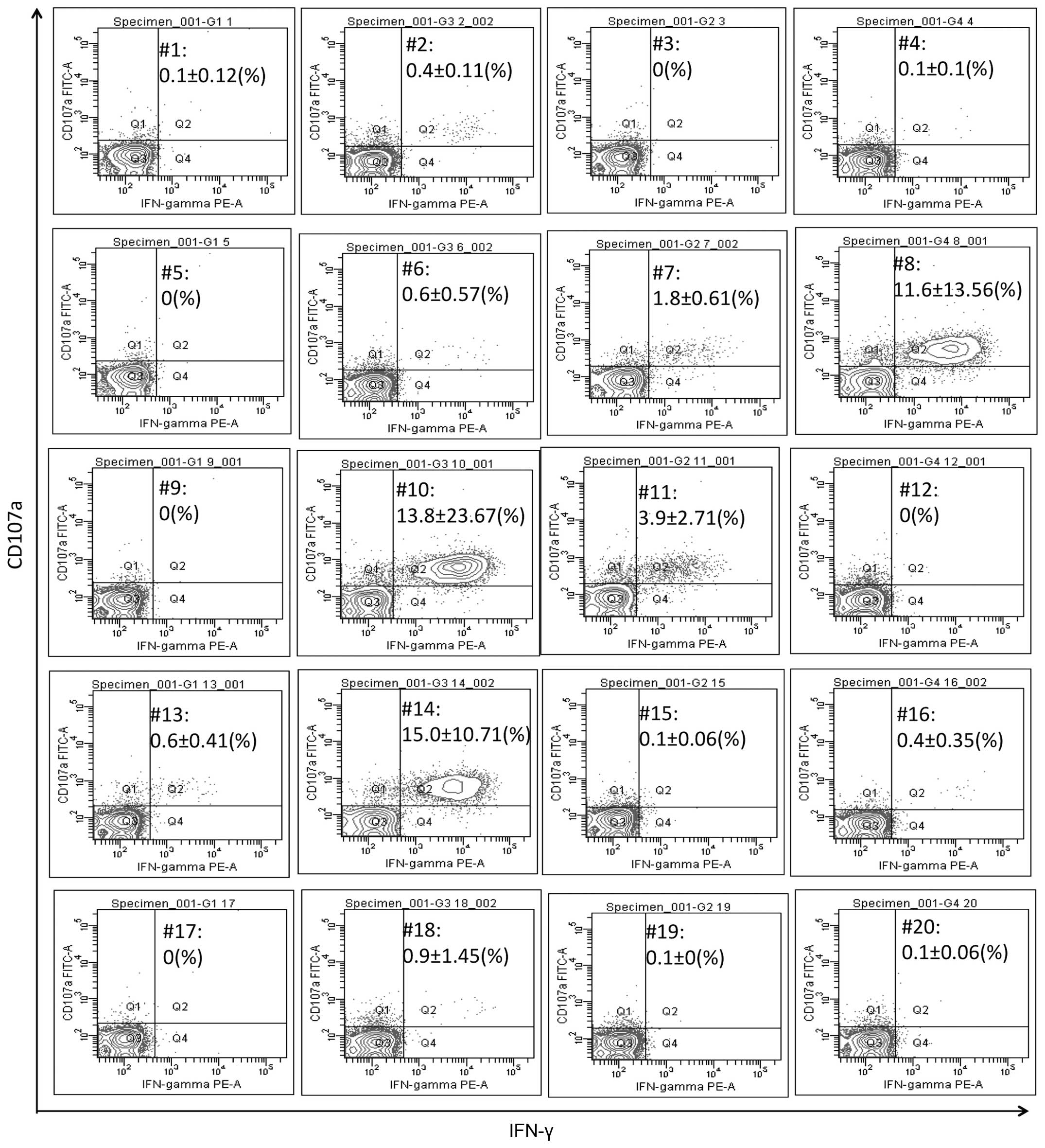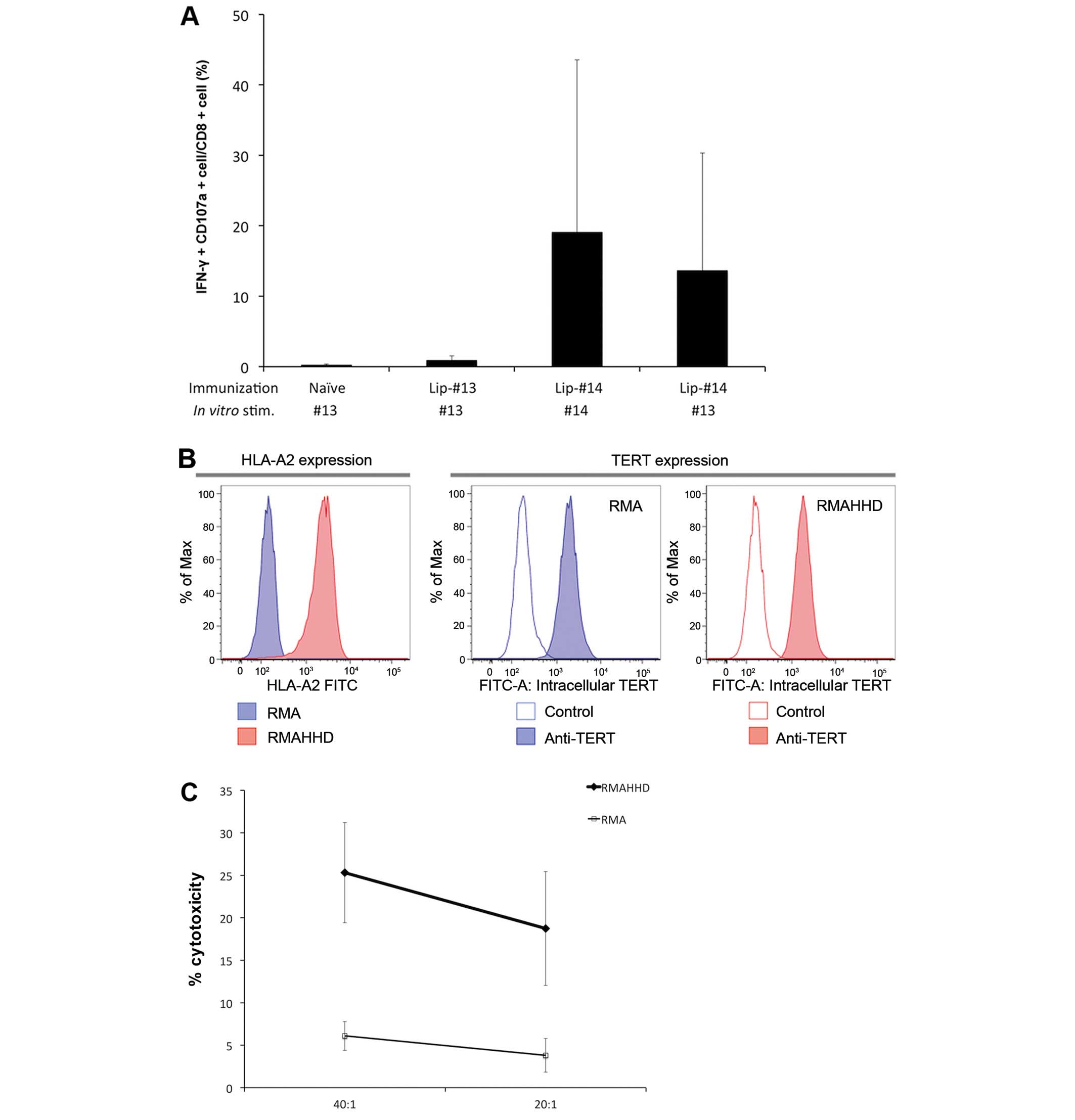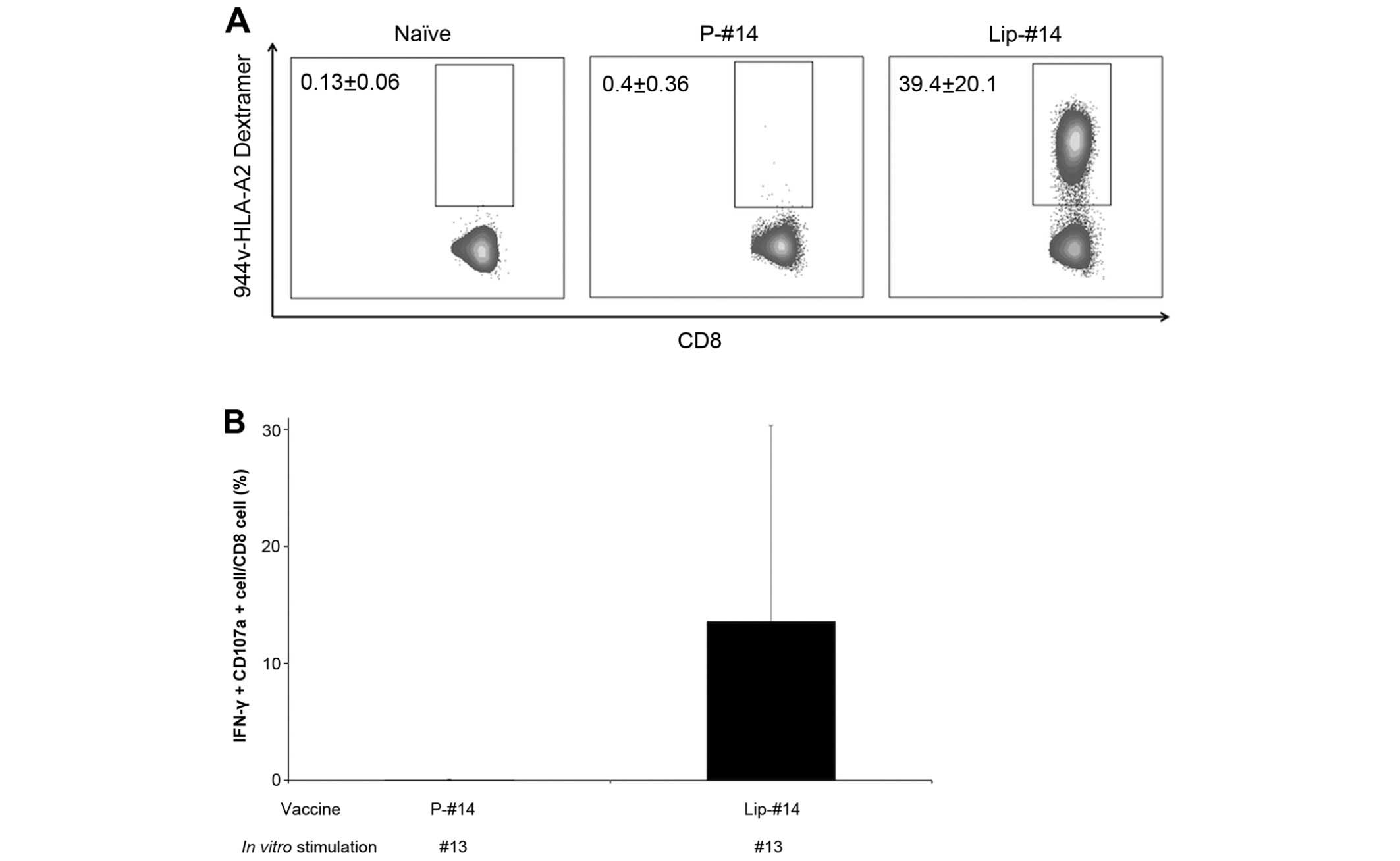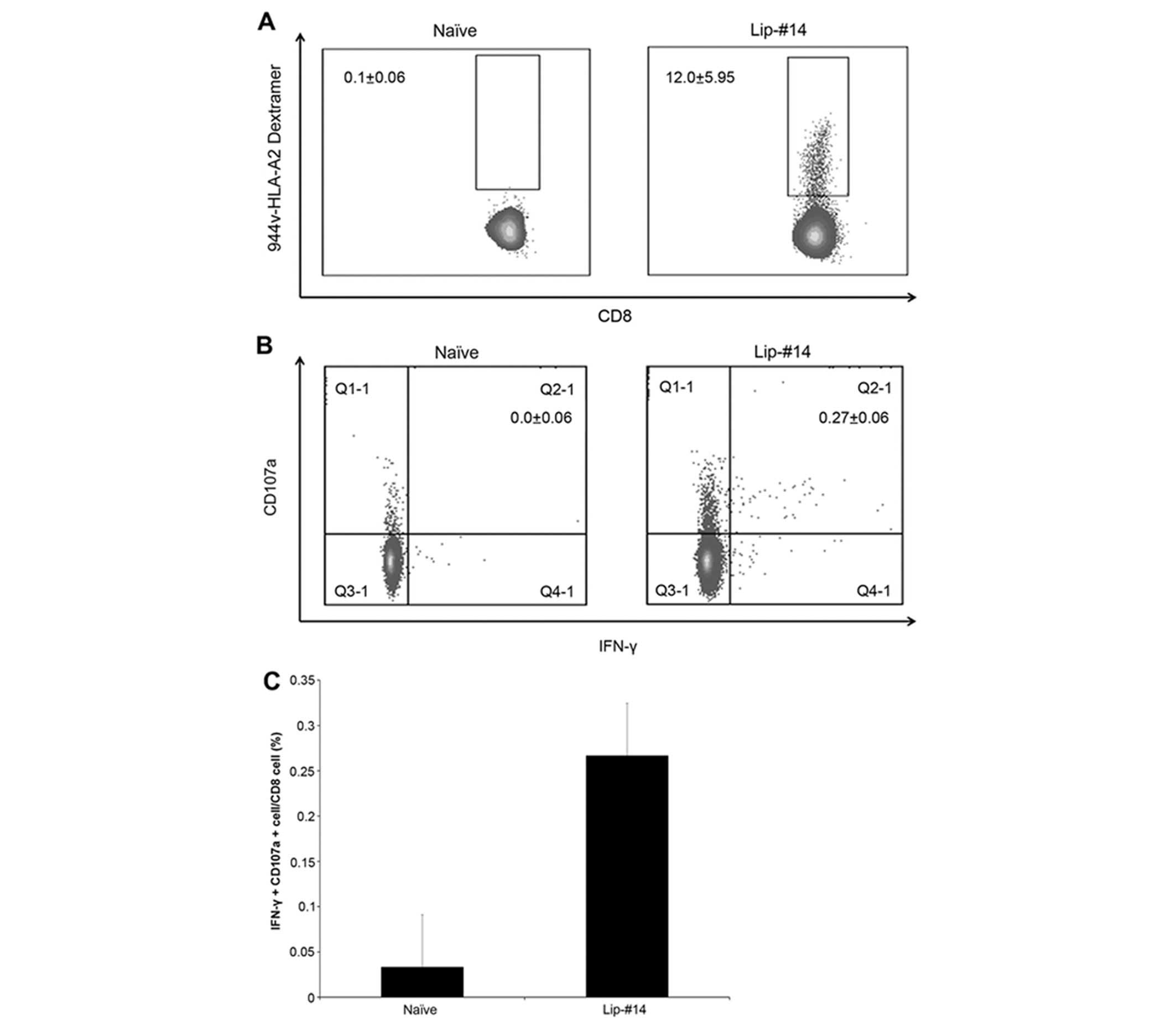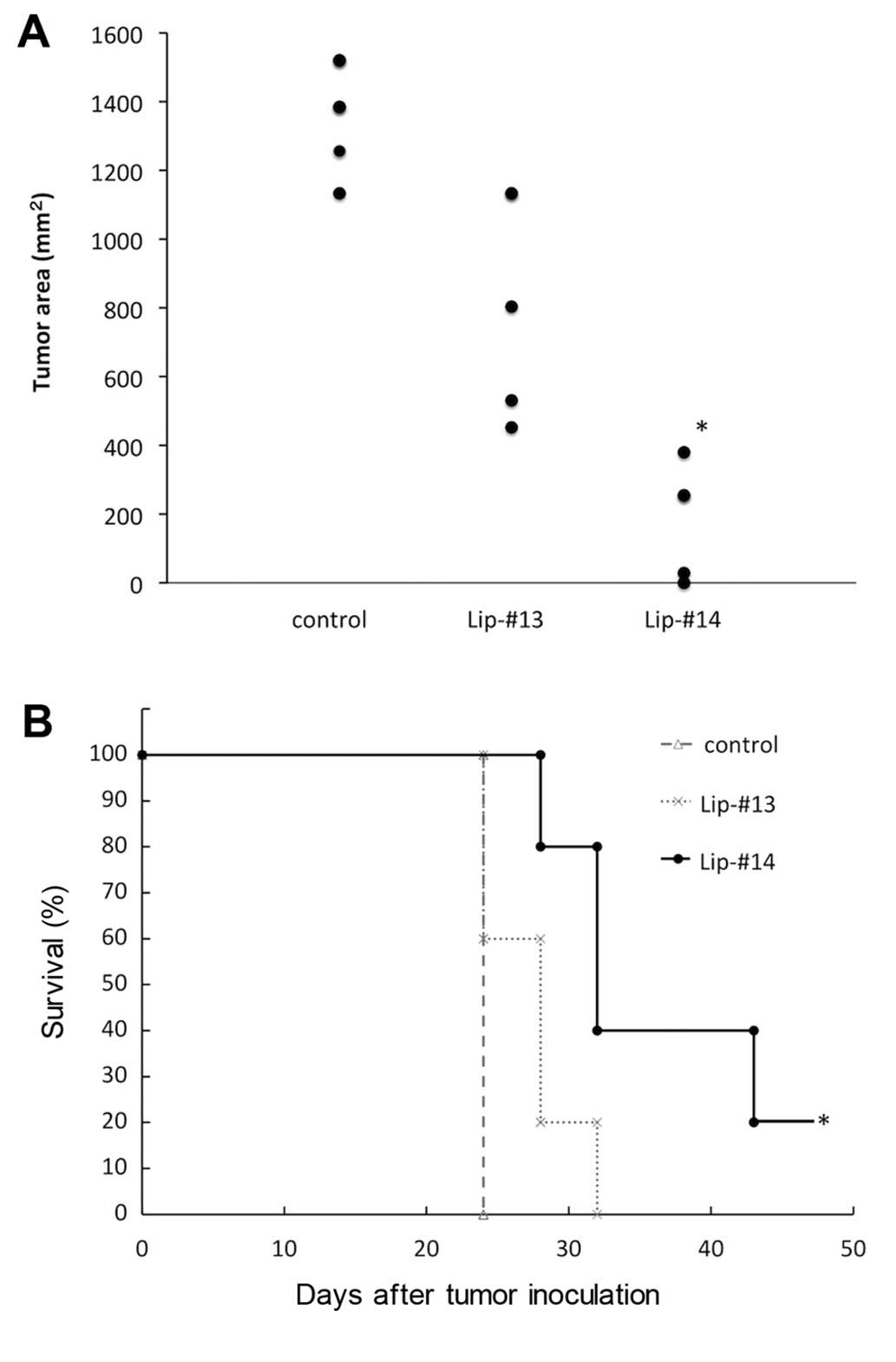|
1
|
Lee PP, Yee C, Savage PA, Fong L,
Brockstedt D, Weber JS, Johnson D, Swetter S, Thompson J, Greenberg
PD, et al: Characterization of circulating T cells specific for
tumor-associated antigens in melanoma patients. Nat Med. 5:677–685.
1999. View Article : Google Scholar : PubMed/NCBI
|
|
2
|
Kawakami Y, Eliyahu S, Delgado CH, Robbins
PF, Sakaguchi K, Appella E, Yannelli JR, Adema GJ, Miki T and
Rosenberg SA: Identification of a human melanoma antigen recognized
by tumor-infiltrating lymphocytes associated with in vivo tumor
rejection. Proc Natl Acad Sci USA. 91:6458–6462. 1994. View Article : Google Scholar : PubMed/NCBI
|
|
3
|
Peek LJ, Middaugh CR and Berkland C:
Nanotechnology in vaccine delivery. Adv Drug Deliv Rev. 60:915–928.
2008. View Article : Google Scholar : PubMed/NCBI
|
|
4
|
Taneichi M, Ishida H, Kajino K, Ogasawara
K, Tanaka Y, Kasai M, Mori M, Nishida M, Yamamura H, Mizuguchi J,
et al: Antigen chemically coupled to the surface of liposomes are
cross-presented to CD8+ T cells and induce potent
antitumor immunity. J Immunol. 177:2324–2330. 2006. View Article : Google Scholar : PubMed/NCBI
|
|
5
|
Takagi A, Matsui M, Ohno S, Duan H, Moriya
O, Kobayashi N, Oda H, Mori M, Kobayashi A, Taneichi M, et al:
Highly efficient antiviral CD8+ T-cell induction by
peptides coupled to the surfaces of liposomes. Clin Vaccine
Immunol. 16:1383–1392. 2009. View Article : Google Scholar : PubMed/NCBI
|
|
6
|
Taneichi M, Tanaka Y, kakiuchi T and
uchida T: Liposome- coupled peptides induce long-lived memory CD8 T
cells without CD4 T cells. PLoS One. 5:e150912010. View Article : Google Scholar
|
|
7
|
Vonderheide RH, Hahn WC, Schultze JL and
Nadler LM: The telomerase catalytic subunit is a widely expressed
tumor-associated antigen recognized by cytotoxic T lymphocytes.
Immunity. 10:673–679. 1999. View Article : Google Scholar : PubMed/NCBI
|
|
8
|
Minev B, Hipp J, Firat H, Schmidt JD,
Langlade-Demoyen P and Zanetti M: Cytotoxic T cell immunity against
telomerase reverse transcriptase in humans. Proc Natl Acad Sci USA.
97:4796–4801. 2000. View Article : Google Scholar : PubMed/NCBI
|
|
9
|
Artandi SE and DePinho RA: Telomeres and
telomerase in cancer. Carcinogenesis. 31:9–18. 2010. View Article : Google Scholar :
|
|
10
|
Hanahan D and Weinberg RA: Hallmarks of
cancer: The next generation. Cell. 144:646–674. 2011. View Article : Google Scholar : PubMed/NCBI
|
|
11
|
Liu JP, Chen W, Schwarer AP and Li H:
Telomerase in cancer immunotherapy. Biochim Biophys Acta.
1805:35–42. 2010. View Article : Google Scholar
|
|
12
|
Arai J, Yasukawa M, Ohminami H, Kakimoto
M, Hasegawa A and Fujita S: Identification of human telomerase
reverse transcriptase-derived peptides that induce
HLA-A24-restricted antileukemia cytotoxic T lymphocytes. Blood.
97:2903–2907. 2001. View Article : Google Scholar : PubMed/NCBI
|
|
13
|
Warnock MG and Goodacre JA: Cryptic T-cell
epitopes and their role in the pathogenesis of autoimmune diseases.
Br J Rheumatol. 36:1144–1150. 1997. View Article : Google Scholar : PubMed/NCBI
|
|
14
|
Scardino A, Gross DA, Alves P, Schultze
JL, Graff-Dubois S, Faure O, Tourdot S, Chouaib S, Nadler LM,
Lemonnier FA, et al: HER-2/neu and hTERT cryptic epitopes as novel
targets for broad spectrum tumor immunotherapy. J Immunol.
168:5900–5906. 2002. View Article : Google Scholar : PubMed/NCBI
|
|
15
|
Gross DA, Graff-Dubois S, Opolon P, Cornet
S, Alves P, Bennaceur-Griscelli A, Faure O, Guillaume P, Firat H,
Chouaib S, et al: High vaccination efficiency of low-affinity
epitopes in antitumor immunotherapy. J Clin Invest. 113:425–433.
2004. View Article : Google Scholar : PubMed/NCBI
|
|
16
|
Tourdot S, Scardino A, Saloustrou E, Gross
DA, Pascolo S, Cordopatis P, Lemonnier FA and Kosmatopoulos K: A
general strategy to enhance immunogenicity of low-affinity HLA-A2.
1-associated peptides: Implication in the identification of cryptic
tumor epitopes. Eur J Immunol. 30:3411–3421. 2000. View Article : Google Scholar : PubMed/NCBI
|
|
17
|
Thorn M, Wang M, Kløverpris H, Schmidt
EGW, Fomsgaard A, Wenandy L, Berntsen A, Brunak S, Buus S and
Claesson MH: Identification of a new hTERT-derived
HLA-A*0201 restricted, naturally processed CTL epitope.
Cancer Immunol Immunother. 56:1755–1763. 2007. View Article : Google Scholar : PubMed/NCBI
|
|
18
|
Cole Dk, Edwards ES, Wynn KK, Clement M,
Miles JJ, Ladell K, Ekeruche J, Gostick E, Adams KJ, Skowera A, et
al: Modification of MHC anchor residues generates heteroclitic
peptides that alter TCR binding and T cell recognition. J Immunol.
185:2600–2610. 2010. View Article : Google Scholar : PubMed/NCBI
|
|
19
|
Pinolla-Ibarz J, May RJ, Koronitsvit T,
Gomez M, Kappel B, Zakhaleva V, Zhang RH and Scheinberg DA:
Improved human T-cell responses against synthetic HLA-0201 analog
peptides derived from the WT1 oncoprotein. Leukemia. 20:2025–2033.
2006. View Article : Google Scholar
|
|
20
|
Parkhurst MR, Salgaller ML, Southwood S,
Robbins PF, Sette A, Rosenberg SA and Kawakami Y: Improved
induction of melanoma-reactive CTL with peptides from the melanoma
antigen gp100 modified at HLA-A*0201-binding residues. J
Immunol. 157:2539–2548. 1996.PubMed/NCBI
|
|
21
|
Kubo RT, Sette A, Grey HM, Appella E,
Sakaguchi K, Zhu NZ, Arnott D, Sherman N, Shabanowitz J, Michel H,
et al: Definition of specific peptide motifs for four major HLA-A
alleles. J Immunol. 152:3913–3924. 1994.PubMed/NCBI
|
|
22
|
Pascolo S, Bervas N, Ure JM, Smith AG,
Lemonnier FA and Pérarnau B: HLA-A2.1-restricted education and
cytolytic activity of CD8(+) T lymphocytes from beta2
microglobulin (beta2m) HLA-A2.1 monochain transgenic H-2Db beta2m
double knockout mice. J Exp Med. 185:2043–2051. 1997. View Article : Google Scholar : PubMed/NCBI
|
|
23
|
Adotévi O, Mollier K, Neuveut C, Dosset M,
Ravel P, Fridman WH, Tartour E, Charneau P, Wain-Hobson S and
Langlade-Demoyen P: Targeting human telomerase reverse
transcriptase with recombinant lentivector is highly effective to
stimulate antitumor CD8 T-cell immunity in vivo. Blood.
115:3025–3032. 2010. View Article : Google Scholar : PubMed/NCBI
|
|
24
|
Takagi A, Kobayashi N, Taneichi M, Uchida
T and Akatsuka T: Coupling to the surface of liposomes alters the
immunogenicity of hepatitis C virus-derived peptides and confers
sterile immunity. Biochem Biophys Res Commun. 430:183–189. 2013.
View Article : Google Scholar
|
|
25
|
Kaech SM, Wherry EJ and Ahmed R: Effector
and memory T-cell differentiation: Implications for vaccine
development. Nat Rev Immunol. 2:251–262. 2002. View Article : Google Scholar : PubMed/NCBI
|
|
26
|
Greenberg RA, Allsopp RC, Chin L, Morin GB
and DePinho RA: Expression of mouse telomerase reverse
transcriptase during development, differentiation and
proliferation. Oncogene. 16:1723–1730. 1998. View Article : Google Scholar : PubMed/NCBI
|
|
27
|
Forni G, Lollini PL, Musiani P and Colombo
MP: Immunoprevention of cancer: Is the time ripe? Cancer Res.
60:2571–2575. 2000.PubMed/NCBI
|
|
28
|
Spurrell EL and Lockley M: Adaptive
immunity in cancer immunology and therapeutics. E Cancer Med Sci.
8:4412014.
|
|
29
|
Blattman JN and Greenberg PD: Cancer
immunotherapy: A treatment for the masses. Science. 305:200–205.
2004. View Article : Google Scholar : PubMed/NCBI
|
|
30
|
Mellman I, Coukos G and Dranoff G: Cancer
immunotherapy comes of age. Nature. 480:480–489. 2011. View Article : Google Scholar : PubMed/NCBI
|
|
31
|
Patel KP and Vonderheide RH: Telomerase as
a tumor-associated antigen for cancer immunotherapy.
Cytotechnology. 45:91–99. 2004. View Article : Google Scholar
|
|
32
|
Beatty GL and Vonderheide RH: Telomerase
as a universal tumor antigen for cancer vaccines. Expert Rev
Vaccines. 7:881–887. 2008. View Article : Google Scholar : PubMed/NCBI
|
|
33
|
Liu K, Schoonmaker MM, Levine BL, June CH,
Hodes RJ and Weng NP: Constitutive and regulated expression of
telomerase reverse transcriptase (hTERT) in human lymphocytes. Proc
Natl Acad Sci USA. 96:5147–5152. 1999. View Article : Google Scholar : PubMed/NCBI
|
|
34
|
Cibotti R, Kanellopoulos JM, Cabaniols JP,
Halle-Panenko O, Kosmatopoulos K, Sercarz E and Kourilsky P:
Tolerance to a self-protein involves its immunodominant but does
not involve its subdominant determinants. Proc Natl Acad Sci USA.
89:416–420. 1992. View Article : Google Scholar : PubMed/NCBI
|
|
35
|
Nanda NK and Sercarz EE: Induction of
anti-self-immunity to cure cancer. Cell. 82:13–17. 1995. View Article : Google Scholar : PubMed/NCBI
|
|
36
|
Uram JN, Black CM, Flynn E, Huang L,
Armstrong TD and Jaffee EM: Nondominant CD8 T cells are active
players in the vaccine-induced antitumor immune response. J
Immunol. 186:3847–3857. 2011. View Article : Google Scholar : PubMed/NCBI
|
|
37
|
Townsend ARM, Rothbard J, Gotch FM,
Bahadur G, Wraith D and McMichael AJ: The epitopes of influenza
nucleoprotein recognized by cytotoxic T lymphocytes can be defined
with short synthetic peptides. Cell. 44:959–968. 1986. View Article : Google Scholar : PubMed/NCBI
|
|
38
|
Tanaka Y, Taneichi M, Kasai M, Kakiuchi T
and Uchida T: Liposome-coupled antigens are internalized by
antigen-presenting cells via pinocytosis and cross-presented to CD8
T cells. PLoS One. 5:e152252010. View Article : Google Scholar : PubMed/NCBI
|
|
39
|
Teulings HE, Limpens J, Jansen SN,
Zwinderman AH, Reitsma JB, Spuls PI and Luiten RM: Vitiligo-like
depigmentation in patients with stage III–IV melanoma receiving
immunotherapy and its association with survival: A systematic
review and meta-analysis. J Clin Oncol. 33:773–781. 2015.
View Article : Google Scholar : PubMed/NCBI
|
|
40
|
Vierboom MP, Nijman HW, Offringa R, van
der Voort EI, van Hall T, van den Broek L, Fleuren GJ, Kenemans P,
Kast WM and Melief CJ: Tumor eradication by wild-type p53-specific
cytotoxic T lymphocytes. J Exp Med. 186:695–704. 1997. View Article : Google Scholar : PubMed/NCBI
|
|
41
|
Harley CB: Telomerase and cancer
therapeutics. Nat Rev Cancer. 8:167–179. 2008. View Article : Google Scholar : PubMed/NCBI
|
|
42
|
Yan J, Pankhong P, Shin TH, Obeng-Adjei N,
Morrow MP, Walters JN, Khan AS, Sardesai NY and Weiner DB: Highly
optimized DNA vaccine targeting human telomerase reverse
transcriptase stimulates potent antitumor immunity. Cancer Immunol
Res. 1:179–189. 2013. View Article : Google Scholar
|
|
43
|
Kotsakis A, Papadimitraki E, Vetsika EK,
Aggouraki D, Dermitzaki EK, Hatzidaki D, Kentepozidis N, Mavroudis
D and Georgoulias V: A phase II trial evaluating the clinical and
immunologic response of HLA-A2(+) non-small cell lung
cancer patients vaccinated with an hTERT cryptic peptide. Lung
Cancer. 86:59–66. 2014. View Article : Google Scholar : PubMed/NCBI
|















